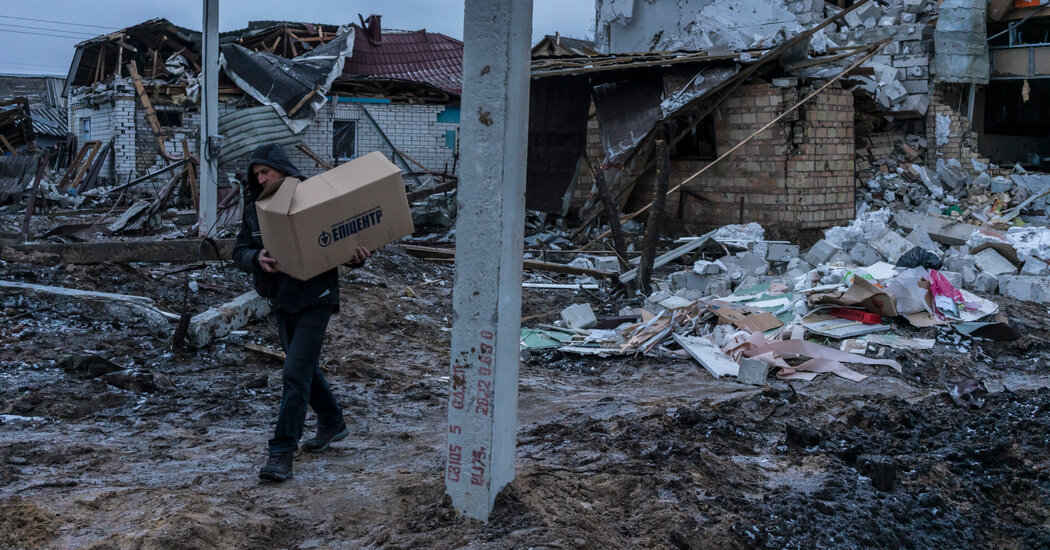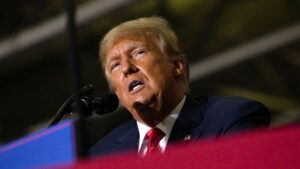
When the World Bank released its latest damage assessment of war-torn Ukraine this week, it announced that the price of recovery and rebuilding had grown to $411 billion. What it didn’t say, though, was who would pay for it.
To Ukraine, the answer seems obvious: Confiscate the roughly $300 billion in Russian Central Bank assets that Western banks have frozen since the invasion last year. As the war grinds on, the idea has gained supporters.
The European Union has already declared its desire to use the Kremlin’s bankroll to pay for reconstruction in Ukraine. At the urging of a handful of Eastern European and Baltic nations, the bloc convened a working group last month to assess the possibility of grabbing that money as well as frozen assets owned by private individuals who have run afoul of European sanctions.
“In principle, it is clear-cut: Russia must pay for the reconstruction of Ukraine,” said Sweden’s prime minister, Ulf Kristersson, who holds the presidency of the Council of the European Union.
At the same time, he noted, turning that principle into practice is fraught. “This must be done in accordance with E.U. and international law, and there is currently no direct model for this,” Mr. Kristersson said.
The working group, which has a two-year mandate, is scheduled to meet in Brussels next week.
Other top officials, in the United States and elsewhere, have sounded more skeptical. After visiting Kyiv last month, Treasury Secretary Janet L. Yellen reiterated her warnings of formidable legal obstacles. The Swiss government declared that confiscating private Russian assets from banks would violate Switzerland’s Constitution as well as international agreements.
The legal debate is just one skein in the tangle of moral, political and economic concerns that the potential seizure of Russia’s reserves poses.
Ms. Yellen and others have argued that seizing Russia’s accounts could undermine faith in the dollar, the most widely used currency for the world’s trade and transactions. Foreign nations might be more reluctant to keep money in U.S. banks or make investments, fearing that it could be seized. At the same time, experts worry that such a move could put American and European assets held in other countries at higher risk of expropriation in the future if there is an international dispute.
There are also concerns that seizure would erode faith in the system of international laws and agreements that Western governments have championed most vocally.
But Russia’s pummeling of Ukraine’s infrastructure, charges of war crimes against President Vladimir V. Putin, and the difficulty of squeezing Russia economically when demand for its energy and other exports remains high have helped the idea gain ground.
Also, there is the uncomfortable realization that the cost of rebuilding Ukraine once the war is over will far outstrip the amount that even wealthy allies like the United States and Europe may be willing to give.
The United States, the European Union, Britain and other allies have funneled billions of dollars into Ukraine’s war effort, as well as tanks, missiles, ammunition, drones and other military equipment. And this week the International Monetary Fund approved its biggest loan yet — $15.6 billion — just to keep Ukraine’s battered economy afloat.
But public support for continued funding is not inexhaustible.
“If it’s difficult to get funding now for maintaining the infrastructure or housing, why is it going to be easier to get funding later?” asked Tymofiy Mylovanov, the president of the Kyiv School of Economics and a former government minister.
It’s hard enough for Ukraine to get money and equipment “while we are being killed,” Mr. Mylovanov said. “Once we’re not being killed, we’ll have difficulty getting anything.”
Laurence Tribe, a university professor of constitutional law at Harvard, has argued that a 1977 law, the International Emergency Economic Powers Act, gives the U.S. president the authority to confiscate sovereign Russian assets and repurpose them for Ukraine.
The U.S. authorities previously seized Iraqi and Iranian assets and redirected them to compensate victims of violence, settle lawsuits or provide financial assistance.
Mr. Tribe concedes that calculations about the ripple effect on the dollar or invested assets will ultimately matter more to policymakers than legal ones. But he finds those broader political concerns unpersuasive.
“It’s crazy to argue that it’s more destabilizing to have assets seized than to have wars of aggression,” Mr. Tribe said in an interview on Friday. “The survival of the global economy is far more threatened by the way Russia behaved” than by any financial retaliation.
And, he added, taking billions of dollars is much more meaningful either as a deterrent or punishment than bringing war crime charges.
Other prominent voices in the United States have endorsed the notion. Lawrence H. Summers, a former Treasury secretary; Robert B. Zoellick, a former president of the World Bank and U.S. trade representative; and Philip D. Zelikow, a historian at University of Virginia and a former State Department counselor, made their case this week in an opinion piece in The Washington Post.
“Transferring frozen Russian reserves would be morally right, strategically wise and politically expedient,” they wrote.
A few countries in addition to Ukraine have taken steps to pry loose foreign assets owned by Russian individuals and entities and use the money for reconstruction. In December, the Canadian government began the process of seizing $26 million owned by the Russian oligarch Roman Abramovich after passing a law easing the forfeiture of private Russian assets from individuals who are under sanctions.
A federal judge in Manhattan gave the go-ahead last month to confiscate $5.4 million from another Russian businessman facing sanctions, Konstantin Malofeev. And Estonia is also seeking to pass legislation that would give the government there similar powers.
But Mr. Tribe, Mr. Summers and others argue that the main focus should be not on seizing private assets, which would be legally much more complicated and time-consuming, but on the hundreds of billions owned by Russia’s central bank.
Wherever the money comes from, the bill keeps growing. Over the past year, Ukraine’s economy has shrunk by a third. The war has pushed more than seven million people into poverty, the World Bank reported, and reversed 15 years of development progress.

